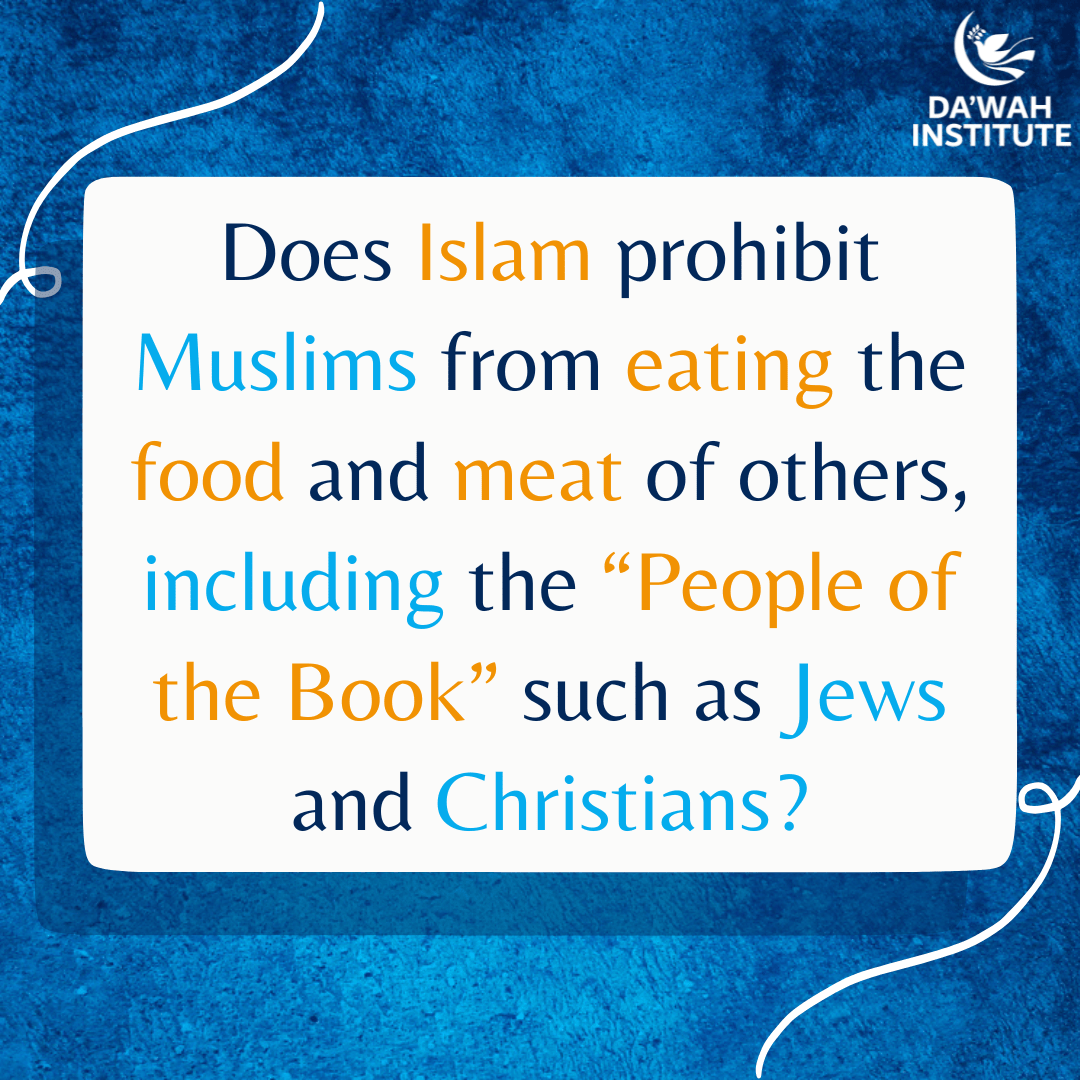
Muslims have not been prohibited from eating non-meat foods that are prepared by people of other faiths (including polytheists, atheists, etc.) such as fruits, vegetables, and other plant products (Muhammad At-Tahir Ibn ‘Ashur, At-Tahrir wa al-Tanwir, Mu’assasa al-Tarikh al-Arabi, Beirut, 2000, vol. 5, p.44). Islam has also not prohibited the consumption of fish, milk, eggs and other similar dairy products that might have been prepared by such people of other faiths (Muhammad At-Tahir Ibn ‘Ashur, At-Tahrir wa al-Tanwir, Mu’assasa al-Tarikh al-Arabi, Beirut, 2000, vol. 5, p.44).
Allah says, “This day (all) the good things are allowed to you, and the food of those who have been given the Book is lawful for you and your food is lawful for them…” (Qur’an 5:5)
Scholars have agreed that the word ‘food’ in this verse refers to slaughtered animals. Bukhari mentioned that Ibn Abbas said, “…‘the food’ is their slaughtered animals” (Muhammad bin Abi Bakr bin Qayyim al-Jawziyyah, Ahkam ahl al-Dhimma, Dar Ibn Hazm, Beirut, 1418AH, vol.1, p.181). Ibn Qayyim also said: “The earliest generation of Muslims (salaf) were in unanimous agreement that the verse (i.e. Qur’an 5:5) refers to the slaughtered animals of the People of the Book – Christians and Jews.” Muhammad bin Abi Bakr bin Qayyim al-Jawziyyah, Ahkam ahl al-Dhimma, Dar Ibn Hazm, Beirut, 1418AH, vol. 1, p.502.
The point here is that this verse (Qur’an 5:5) comes to settle the issue of the slaughtered animals of the People of the Book, in view of the fact that it has already been mentioned in Qur’an 5:3, that: ‘Forbidden to you are the flesh of dead animals and blood and the flesh of swine, and that which has been dedicated to any other than Allah.”
Based on a number of hadiths and opinions of the Companions of the Prophet (p), Muslim scholars have however disagreed on a number of details regarding eating an animal killed by non-Muslims (Ibn Rushd, Bidayat al-Mujtahid wa Nihayat al- Muqtasid, Al-Maktabah Al-‘Asriyyah, Beirut, vol.1, p.461-464). They disagreed for example on whether non-Muslims should comply with the Islamic rules of slaughtering animals in a more merciful way – such as with a sharp knife to the neck, etc. – instead of other more painful methods, and on whether Allah’s name must be mentioned (as recommended by Qur’an 6:121) when they slaughter their animals, and on whether it is permissible to eat an animal slaughtered for their festivals such as Christmas (Ibn Rushd, Bidayah al-Mujtahid wa Nihayah al-Muqtasid, Al-Maktabah Al-‘Asriyyah, Beirut, vol.1 p.461-464). Some regarded these as all permissible (Ibn Al-Arabi, Ahkam al-Qur’an, Dar al-Kutub Al-‘ilmiyyah, vol.3. p. 55), while others did not Yusuf al-Qaradawi, The Lawful and the Prohibited in Islam, IIFSO, Kuwait, 1992, p.60-61; Ahmad Amharzi ‘Alawi, Majallah al-Bayan, vol. 131, p. 8
The companion, Ali bin Abu Talib said: “If you hear a Jew or Christian mentioning other than Allah (on their animal) do not eat it. If you did not hear them mentioning other than Allah on it, eat it because Allah has permitted their animal for us and He knows what they utter” (Ahmad Ibn Ali Ar-Razi Al-Jassas, Ahkam al-Qur’an, Dar Ihyah Al-Turath Al-Arabi, Beirut, 1405, vol.1, p.155) Based on this and other pieces of evidence, many respected Muslim scholars are of the opinion that a Muslim is also not required to inquire into how an animal was slaughtered nor what was mentioned or not mentioned when it was being slaughtered. Ibn Hazm, Al-Muhallah, vol.7, p.457; Kasani, al-Badai’ Al-Sanai’, vol.5, p.46
Hence, other foods of the Ahl al-Kitab, besides slaughtered animals remain lawful (halal) in the absence of any evidence justifying their prohibition. This is in accordance with the general principle that “the original premise of all things is permissibility” Principle of Usul ul-Fiqh in Arabic is called “Al-‘asl fil ashya‘i al-ibahah” (“the legal premise of everything is permissibility”), Yusuf al-Qaradawi, The Lawful and the Prohibited in Islam, IIFSO, Kuwait, 1992, pp.14-18
It has been reliably reported that the Prophet Muhammad (p) and his Companions ate food, including meat, slaughtered and prepared by Jews and Christians. Al-Bukhari, Sahih al-Bukhari, Dar Tawq al-Najat, 1422 A.H, vol.6, p.509, hadith no. 2617; Muslim, Sahih Muslim, Dar al-Jeel, Beirut, vol.7, p.14., hadith no. 5834.
What has been prohibited (haram) is the consumption of animals that are sacrificed as offerings to idols, or “dedicated to any other than Allah” (Qur’an 6:121). Muslims are also forbidden from eating animals that have been killed in cruel ways, such as by being clubbed or beaten to death, by being strangled, or by being made to fall from a height, etc. (Qur’an 5:3).




